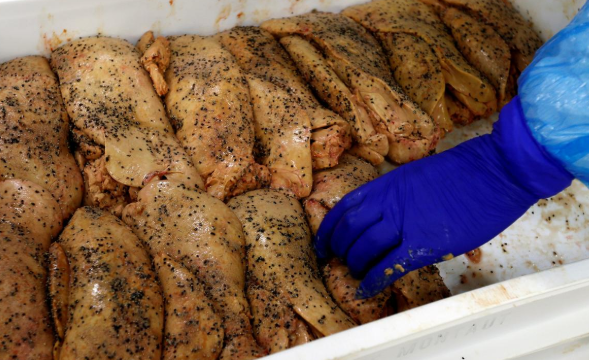
Amid the increasing scrutiny against the industry, foie gras will finally be banned in New York City after the council voted against it.
Bill de Blasio, the mayor of New York City, confirmed to CNN that he will sign the bill into law. Once it is implemented, foie gras must be phased out within three years. Whoever caught selling it after the adjustment period will be fined for at least $2,000.
"It's inhumane."
Councilwoman Carlina Rivera, the main sponsor of the bill, said that the production of foie gras is an "inhumane practice".
Foie gras means "fatty liver" in French, and like what its name suggests, it is retrieved from fattened duck or goose. It is a protected cultural heritage of France.
To produce it, a force feeding must be done by ramming a pipe down the throat of male ducks twice a day, or geese three times a day, according to PETA. By making these animals eat up to 4 pounds of grain and fat, their liver would swell up to 10 times the normal size.
But the terror does not end here. The birds were confined in small cages that deprived them from their basic movements like flying, swimming and especially grooming themselves. As a result, their feathers were covered with grease and dirt.
"No, It's not abusive."
Farmers defend that their method of producing foie gras is not inhumane like people assume. According to them, ducks really fattened themselves as preparation for migration journeys.
The farmers also claimed that the esophagi of those birds are stretchable so metal feeders do not really hurt them. As a proof of its elasticity, ducks eat their food whole, they added.
Videos of abhorrent facilities had circulated online, but the producers claimed that it only represents the minority.
We conform with human animal management and in compliance with the state law of New York, claimed Marcus Henley, the manager of the largest foie gras producer Hudson Valley Foie Gras.
At least 15,000 ducks die annually in the farm of Hudson Valley before they can be slaughtered., according to PETA
Now that there is a ban of the product that contributes to a third of their farm's revenue, Henley said he will head to court to seek to overturn.
Lastly, they said that there are much worse food industry practices than foie gras production, and people should criticize those more.
Foie gras ban in the US
This was not the first time the luxury food was banned in the United States.
California banned it in 2012 but got overturned in 2015. Two years later, it was reconsidered until the Supreme Court supported the ban in January 2019.
Chicago also banned it in 2006. Unfortunately, foie gras became legal again in 2008 through the former Mayor Richard Daley. Daley even called it the "silliest ordinance" passed in the city.
© 2025 NatureWorldNews.com All rights reserved. Do not reproduce without permission.





